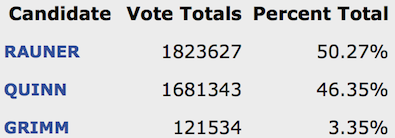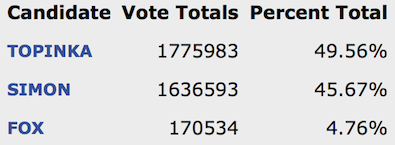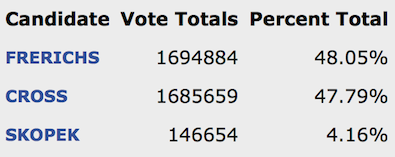Chicago to test police body cams
Monday, Dec 1, 2014 - Posted by Rich Miller
* The issue of police body cameras was one of the biggest impediments to revamping Illinois’ unconstitutional eavesdropping law earlier this year. Some cops weren’t thrilled with the idea. But after the Michael Brown shooting, attitudes are changing…
Chicago police Superintendent Garry McCarthy said Monday the department would begin testing body cameras on officers in about 60 days. […]
The cameras — about the size of a pager and typically clipped to the front of a shirt — are intended to capture an officer’s interaction with the public on video and audio, providing potentially critical evidence in any dispute.
The new technology has won early backing from disparate groups that often clash over law enforcement issues — from the American Civil Liberties Union of Illinois and the state NAACP to the union that represents rank-and-file Chicago police officers and the Independent Police Review Authority, which investigates allegations of misconduct by officers.
Proponents hope the cameras will reduce the number of citizen complaints and costly lawsuits about police misconduct while at the same time discouraging citizens from making baseless accusations against officers. The U.S. Justice Department has warned of the scarcity of research on the cameras’ effectiveness, but a widely cited study of body cameras in 2012 by police in Rialto, Calif., a small town about 55 miles east of Los Angeles, found that complaints against its officers plummeted by 88 percent that year while officers’ use of force dropped by 60 percent.
* Rep. Elaine Nekritz may move a bill through the Statehouse next year…
Elaine Nekritz is the chair of the Illinois House Judiciary Committee. She says police and citizen behavior gets better when an interaction is recorded by a camera.
“The real negative side if you want to call it that is the cost and then I think there are some real policy questions as to what kind of interactions can be recorded and who has access to that data.”
* The debate is now down to the details, like when an officer can shut off the camera…
Ed Yohnka, of the American Civil Liberties Union, agreed that determining officer discretion was critical to the fairness of a law on officer body cameras.
“When you get down to it, the question becomes how much discretion are you going to give a police officer for what interactions they record and which ones they don’t,” he said.
Yohnka said officers should have few exceptions on when they should stop recording. They would include risk to public or police safety, at the request of a crime victim or when police talk with confidential sources. Yohkna said police also should be required to set a 90-day time limit on keeping videos.
From the local police perspective, Hartshorn and Lemming said they thought local departments should be trusted with disciplining their officers, and Smoot agreed, saying, “If there is a situation where the officer is not using the tool properly, then departments will have a way to deal with that.”
* And there are other concerns…
“Where is that data stored?” [Nekritz] asks. “How much of it is kept (and) for how long? And then who has access to it? Does the media have access to every interaction?”
16 Comments  
|
Reformers blast new FOIA bill
Monday, Dec 1, 2014 - Posted by Rich Miller
* Illinois Public Radio…
Illinois residents could have a harder time accessing government information under new legislation before the General Assembly.
The plan, SB2799, makes it harder for people to get repaid legal costs when a government wrongfully denies access to public documents.
At the same time, it makes it easier for governments to keep certain information off-limits.
Groups such as the Better Government Association, the Illinois Press Association (a representative there called the measure the most egregious changes to FOIA since the law was restructured) and the Attorney General’s office are fighting it.
Natalie Bauer, a spokeswoman for the Attorney General, says it will make it incredibly more difficult to obtain public information that taxpayers are owed.
* From Illinois PIRG…
“Transparency in government checks corruption, promotes fiscal responsibility and allows for greater, more meaningful participation in our democratic system,” said Abe Scarr, Director of Illinois PIRG. “This bill moves Illinois in the wrong direction and should be rejected.”
“Democracy is meaningless without a responsible, informed, and active citizenry. In turn, strong public record request laws are essential to inform of the public of government activity,” said Maryam Judar, Executive Director of the Citizen Advocacy Center. “This bill distorts Illinois democracy by limiting people’s access to information about their government activity. The House should not allow this provision to pass.”
The bill makes three significant changes to the state’s Freedom of Information Act.
· When a government official publicly cites a report or study, the entire report is currently subject to public records requests. Under this bill, only the specific section cited would be open to disclosure. This limits the public’s ability to see supporting documentation, methodology, and possibly conflicting findings in a document being cited in government decision making.
· The bill would allow government bodies to withhold documents that are primarily factual so long as they include at least one recommendation.
· The bill would significantly curtail a citizen’s ability to win legal fees from a government body when they violate FOIA. This would significantly limit the public’s ability to hold government bodies accountable when they illegally withhold public documents.
Combined, these changes would significantly limit information accessible to the public and make it easier for government bodies to skirt transparency laws.
The legislation, sponsored by House Majority Leader Barbara Flynn Currie, has been assigned to the totally wired Executive Committee, which meets this afternoon at 4. The underlying shell bill is sponsored by Speaker Madigan.
29 Comments  
|
*** UPDATED x1 *** Board certifies results
Monday, Dec 1, 2014 - Posted by Rich Miller
* The Illinois State Board of Elections has certified the November results…



So, Rauner holds onto his majority, Topinka is held to under 50 percent and significantly below her 52.6 percent from four years ago, and Frerichs wins by a mere 9,225 votes…
According to the data dating to 1900 reviewed by AP, the 0.261 percentage-point difference makes it a tighter campaign than any other except the 1982 battle for governor and the 1952 race for secretary of state.
* Meanwhile…
The board’s canvass showed first-term Democratic Rep. Kate Cloonen beating Republican challenger Glenn Nixon in the Kankakee area 50.2 percent to 49.8 percent.
Freshman Democratic Rep. Mike Smiddy beat Republican Jim Wozniak in the Quad Cities region 50.5 percent to 49.6 percent.
And Deputy Majority Leader Frank Mautino won a 13th term in north-central Illinois over the GOP’s Jerry Lee Long, 50.5 percent to 49.5 percent.
Those three Democrats won by a grand total of 773 votes.
*** UPDATE *** Oops. Forgot one…
The sole Illinois Supreme Court justice who was on the ballot in last month’s election was sworn in for a second term this morning. Official results released last night by the Illinois State Board of Elections show just how close Supreme Court Justice Lloyd Karmeier was to losing his seat, after an election that saw hefty spending on both sides.
Never has a sitting member of Illinois’ high court lost a bid for retention, but Justice Lloyd Karmeier got close. He earned another ten years on the bench, with a margin of less than one percent (new state board of elections figures show that Karmeier got support from 60.77 percent of voters; he needed 60-percent approval to keep his spot).
Super, super close.
42 Comments  
|
Minimum wage politics
Monday, Dec 1, 2014 - Posted by Rich Miller
* Crain’s…
Mayor Rahm Emanuel is moving to jump-start his proposal to raise Chicago’s minimum wage to $13 an hour, fearing that the Illinois General Assembly may be about to pre-empt the city’s ability to do so.
The mayor has called a special City Council meeting for Tuesday, Dec. 2, to vote on his proposed ordinance. The council’s Committee on Workforce Development and Audit will consider the plan a day earlier. Approval is expected even though some aldermen are urging an even higher figure of $15 an hour.
“We have decided to proceed [this] week because of the possibility that there may be an attempt to pre-empt the Chicago ordinance,” said Kelley Quinn, the mayor’s spokeswoman. “Taking this step first is the best way to prevent that from happening.”
The move comes as Mr. Emanuel, who has had trouble connecting with some low-income or minority voters, runs for re-election on Feb. 24.
Under the mayor’s proposal, the wage increase would be phased in, starting roughly seven months from now. It would hit $10 an hour by July 1 and $11 within three years. Thereafter, it would go up $1 per year to eventually reach $13 an hour.
* Sun-Times…
City officials hope to pass an ordinance that, in part, mirrors a state bill sponsored by Sen. Kimberly Lightford (D- Maywood).
By 2017, both the city and state would move to $11.
But in Chicago, in 2018, the wage would go up $1 — to end up in 2019 at $13, city officials said.
Lightford said she’s confident her bill will pass in Springfield next week.
But she wasn’t sure Friday what Chicago’s ordinance will mean if her bill passes and is signed by Gov. Pat Quinn.
“I just don’t know if the city can say … we can move ours higher and the state can’t do anything about it,” Lightford said.
* 19th Ward Ald. Matt O’Shea is not happy with the idea…
You don’t need a Nobel Prize in economics to realize a higher minimum wage on the Chicago side of the city limits will drive businesses to the suburbs. A downtown clothing outlet with a captive and affluent customer base might be able to survive employee costs that are 30 to 50 percent higher than a similar store in a far-away suburban mall, but what about a store that operates in a neighborhood on the city’s border? Just like the downtown store, that neighborhood business would have to raise prices to pay its work force a higher Chicago wage. But unlike downtown, the neighborhood store’s customer-base would have plenty of lower-priced options in nearby suburbs, some of which could be reached by literally walking across the street. As such, if we raise the Chicago minimum wage higher than neighboring municipalities, we should be prepared to watch businesses and millions of dollars in tax revenue cross the street, too.
Numbers I’ve seen show that 20 percent of the city’s businesses are clustered around the city’s edges.
* Meanwhile, speaking of hizzoner’s reelection…
Mayor Rahm Emanuel has received $400,000 in political donations that he was able to keep only because the state’s campaign contribution limits were eliminated through the actions of an obscure candidate who threatened to run, but didn’t.
The contribution limits were lifted for everyone in the Chicago mayoral race last month after frequent local candidate William J. Kelly filed paperwork in October showing he gave his own campaign $100,000. Under state law, once a candidate in a local race contributes $100,000 to his or her own campaign within one year of an election, the state contribution caps no longer apply.
But Kelly didn’t file the necessary petition signatures by Monday’s deadline to appear on the ballot. Nonetheless, the lifting of the campaign limits remains in place.
* And…
With City Hall as a backdrop, Cook County Clerk David Orr stood with mayoral contender Jesus “Chuy” Garcia on Sunday and anointed him as the progressive alternative to Mayor Rahm Emanuel and his top-down style.
He “is humble, which is unusual for a politician,” Orr said when he was asked why Garcia — who is also a Cook County commissioner — would be a better mayor than Emanuel. He’s “someone who will listen to people, someone who understands.”
Then Orr tweaked the mayor, who has an enormous fundraising advantage over Garcia but who Chicagoans have expressed dissatisfaction with in public opinion polls.
“The mayor, with millions, has a hard time getting signatures on his petitions. Chuy Garcia in three weeks time, spending no money — all volunteers — got 60-some thousand,” Orr said. “In another week, they probably would have gotten 90,000.”
…Adding… Related…
* Minimum wage poses predicament for service agencies
* Sam Toia: Restaurateurs want Illinois minimum wage increase that’s fair and reasonable
43 Comments  
|
* It’s December and you know what that means: Golden Horseshoe Awards month.
For you newbies, the awards have grown from a sorta tongue in cheek end of the year thing into a coveted annual prize. Also, I judge these awards based more on intensity of the nominations than on actual vote counts. If you just nominate somebody without explanation, I’m likely to ignore it. So explain your votes, please.
* As is our custom, we’ll start with “social staff”…
* Best Statehouse-area bartender
* Best Statehouse-area waiter/waitress
Last year’s best bartender was Adam at the No Name Bar. I didn’t receive enough nominations for best waiter/waitress and announced I was discontinuing the category, but let’s try this one more time.
27 Comments  
|
Disclosure questions
Monday, Dec 1, 2014 - Posted by Rich Miller
* Some commenters pointed this out the other day, and I heard the same thing from some Statehouse types…
Meanwhile, somebody pointed out to me that at makeillinoisgreat.com, which is the website for the transition to the Rauner administration that takes the reins of government on Jan. 12, there’s an interesting combination of actions a visitor can take.
While there is a place to provide ideas, there is also a place to submit a resume, and another to donate to the transition.
Given the difficult history of Illinois, where donations and jobs have sometimes come too close together for comfort, I asked Rauner spokesman Mike Schrimpf about this.
“Personnel decisions aren’t impacted by contributions,” Schrimpf said. As in the case of contributors to the campaign, he said, there will be “no special favors. Period.”
“We didn’t want taxpayers to have to foot the bill for the transition and believe disclosing contributors will provide the sunshine necessary for taxpayers to feel confident in the process.”
Neither “Make Illinois Great” nor “Bruce Rauner Transition Committee” is a registered political action committee, so we won’t know if somebody contributed and later got a job unless Rauner publicly discloses all of his contributions.
* While I highly doubt that we’re looking at a potential money-changing situation here, in the interest of transparency, Rauner probably ought to consider disclosing everything.
Then again, I can also see the other side. If Rauner does disclose those contributions and a highly qualified person gets a state job after contributing to the committee, that person will undoubted be smeared by the media’s broad brush.
So, perhaps a rethink may be in order here.
…Adding… From Mike Schrimpf…
Our November 5 press release about the transition said that we’d be disclosing contributions.
12 Comments  
|
Today’s number: 93 percent
Monday, Dec 1, 2014 - Posted by Rich Miller
* Sun-Times…
A 2011 study by the Illinois Latino Policy Forum shows that 93 percent of the city’s Latino population under age 18 are U.S. citizens.
“This means that as this large young demographic comes of age, the proportion of Latinos eligible to vote will increase significantly — as will their share of the electorate and ability to affect the outcomes of elections,” the study says.
15 Comments  
|
I think something just froze over
Monday, Dec 1, 2014 - Posted by Rich Miller
* From a January 5, 2014 Bloomington Pantagraph editorial…
Fundamentally, Quinn’s approach rests on the assumption that the state has a revenue problem. But that’s not the case. The state’s biggest financial problem is a lack of spending discipline.
There is no reason to give the state additional revenue, and Quinn’s approach ignores the fact that taxpayers are already paying more.
The governor needs to understand that adding taxes — no matter how popular it may sound — is a failed strategy.
* From a June 1 Bloomington Pantagraph editorial…
We have heard many of the Democrats say consistently that it’s impossible to cut the budget enough to make up for the lower tax revenues caused by rolling back the tax rates. But then we get another story, like the one by Springfield Bureau Chief Kurt Erickson, that millions of dollars have been spent in Medicaid payments to dead people. The savings are there; the General Assembly just needs to look for them.
OK, those were not payments to dead people. Those were payments to providers, but whatever. That’s not the point here.
* From the Bloomington Pantagraph’s endorsement of Bruce Rauner…
But the job-killing income tax and an anti-business sentiment that prevails in state government has harmed the state’s economy.
* Guess what happened after their guy won the governor’s race? From a November 30, 2014 Pantagraph editorial…
For the short term, reductions in spending and increases in revenues are the only practical solutions to the state’s budget problems.
All emphasis added for obvious reasons.
57 Comments  
|
Biss, Kamis, Patel named to “40 under 40″
Monday, Dec 1, 2014 - Posted by Rich Miller
* A couple of state politics types were named to Crain’s Chicago Business’ annual “40 under 40″ list. Sen. Daniel Biss…
If it’s complicated and controversial, Sen. Daniel Biss is likely in the middle of it. As a Democratic freshman state senator from the North Shore, he jumped to co-sponsor gay marriage legislation and use his Ph.D. in math from MIT to help craft pension reform law. “Daniel is just scary-smart—I don’t know any other way to put it,” says Rep. Elaine Nekritz, D-Northbrook, who chairs the House Pension Committee. “He’s the idea guy.”
Before becoming the state Legislature’s resident policy wonk, Biss was an algebraic topologist who taught math at the University of Chicago. Now he’s crunching the numbers behind such ideas as automatic enrollment in retirement savings plans at companies without pension benefits. A bipartisan bill to this effect has riled up the insurance industry, which fears it would drive down fees, he says.
Still, don’t pigeonhole him as a numbers guy. “I don’t want that to be all I do,” says the father of two, a skilled juggler who occasionally flips lit torches for his kids’ amusement in his Evanston backyard. He recently ushered into law two bills—one that cracks down on patent trolls, another that allows townships to consolidate. Running unopposed for re-election this year, Biss admits to toying with the idea of seeking higher office. Says Nekritz: His future “is whatever he wants.”
* And John Kamis…
The power of belief was instilled early in John Kamis, whose mother, Eiline, once was a nun (and died when he was 5). For his part, Kamis has faith that Illinois government can be saved. And his instrument, Innovation Illinois, a nascent left-of-center advocacy group, aims to convert such beliefs into action by mining voter sentiment and using it to sway rank-and-file state legislators on issues such as gay marriage, despite the General Assembly’s oligarchic reputation. “He’s selling ideas, not charisma,” says Christopher Kennedy, who chairs the group.
So far, Kamis, a partner at Chicago-based Carpenter Lipps & Leland who ran Gov. Pat Quinn’s 2010 primary campaign, has raked in $100,000 for the group, which inevitably will be seen as a counterforce to the right-of-center Illinois Policy Institute. Not quite so, says Kamis, who as a Quinn adviser oversaw Budgeting for Results, a work-in-progress seeking to measure government output. To which Kennedy, chairman of the University of Illinois board of trustees, says amen: “Innovation Illinois needs to stand on its own—not simply be against somebody else.” Kamis, he adds, “has a capacity to be an honest broker.”
* Also definitely worth mentioning, Amisha Petel…
Patel became an activist and, since 2007, the executive director of the Grassroots Collaborative, a powerful coalition of labor and community groups. Small but mighty, the nonprofit—which had a $319,000 budget in 2013—aims to connect the dots of wages, violence, poverty and affordable housing.
An early coup was the 2006 Big Box Living Wage Ordinance, which required retailers like Wal-Mart to pay Chicago workers $9.25 an hour. A few years later, Patel and her group spotlighted the mayor’s property tax kitty, tax-increment financing, and helped force the Chicago Mercantile Exchange to relinquish $15 million in TIF subsidies back to city coffers. United Airlines followed suit, returning $1.5 million of its own TIF funds.
Patel’s campaign ultimately spurred a policy shift: Now TIF districts with a balance of more than $1 million must release at least a quarter of available funds back to the city and schools.
While her work involves many people, Patel’s influence is distinct, say those who know her. Through the Grassroots Collaborative, she has “laid the foundation for this moment,” says Jackson Potter, staff coordinator at the Chicago Teachers Union. That moment: making 2015 the year of securing better wages for hardworking Chicagoans.
Congrats to all. The full list is here.
* Also, a heads up, we’ll start taking nominations later today for our annual “Golden Horsehoe” awards.
28 Comments  
|
Indiana booster resorts to red-baiting
Monday, Dec 1, 2014 - Posted by Rich Miller
* Allan Katz unfavorably compared Illinois to Indiana in the Northwest Indiana Times…
British Prime Minister Margret Thatcher said, “The trouble with socialism is that eventually you run out of other people’s money.” That’s what happened in Illinois. The voters know it, and the election of Rauner is a grassroots storming of the gates of Springfield.
Socialism? Really?
* It just so happens that TheStreet.com published a new study over the holiday weekend…
Socialism at its core is a political term applied to an economic system in which individual property, like money, is held and used in common, within a state or a country as an attempt to equalize the standard of living for the average citizen. […]
But if America is really turning into a more socialist country, then where can we see evidence of this happening? Are any states becoming socialist before our eyes? And if so, how do we define the most socialist state, you ask?
In order to measure the degree to which different states reflect socialist principles, we determined state expenditures and state GDP as the best indicators because socialist states tax and spend a higher percentage of their GDP. We used data on the total state expenditures for fiscal year 2013 from the most recent National Association of State Budget Officers report and pulled 2013 gross domestic product by state data from the Bureau of Economic Analysis.
The math? Simple. The FY2013 state expenditure divided by the state’s 2013 GDP.
* Illinois comes in as the 10th least Socialist state in America…
Total State Expenditures (FY 2013): $66.4 Billion
Gross Domestic Product (2013): $671.4 Billion
Expenditures as Proportion of GDP: 9.90%
* Indiana comes in as the 7th least Socialist state…
Total State Expenditures (FY 2013): $27.8 Billion
Gross Domestic Product (2013): $294.2 Billion
Expenditures as Proportion of GDP: 9.44%
Barely a difference there.
33 Comments  
|
Out with the old, in with the new
Monday, Dec 1, 2014 - Posted by Rich Miller
* My Crain’s Chicago Business column…
Democrat Rod Blagojevich was elected governor a dozen years ago on promises of a fresh start, tough reforms and change. After 26 years of Republican rule, the voters bought into the populist message.
In his re-election campaign, Blagojevich portrayed his Republican opponent, Judy Baar Topinka, as a longtime insider and trounced her by 10 points. The only thing that truly changed, however, was that the governor and the General Assembly constantly bickered, to the exclusion of progress. His impeachment was a relief.
Blagojevich, like his successor, Gov. Pat Quinn, didn’t come from the Democratic Party’s “governing wing.” They were both outsider rock-throwers. Quinn attempted to govern but didn’t do it well and eventually became identified as leader of the status quo. So the rock-thrower who never totally got his arms around the job was viewed by voters as being too much of an insider.
Out with the old rock-thrower, in with a new and improved rock-thrower: Bruce Rauner.
Click here to read the rest before commenting, please. Thanks.
28 Comments  
|
|
Comments Off  
|
|
 Support CapitolFax.com
Support CapitolFax.com
Visit our advertisers...

 ...............
...............
 ...............
...............
 ...............
...............
 ...............
...............
 ...............
...............
 ...............
...............


|
   
|
Hosted by MCS
SUBSCRIBE to Capitol Fax
Advertise Here
Mobile Version
Contact Rich Miller
|


















